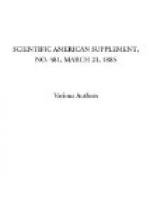Table C.
-------------------------------------------------------
-- Articles. |Percentage higher | Percentage higher | in Mass. | in Great Britain --------------------------------------------------------- Groceries | 16.18 | — Provisions | — | 20.00 Fuel | 104.98 | — Dry goods | 13.26 | — Boots and shoes | 42.75 | — Clothing | 45.06 | — Rents | 89.62 | — --------------------------------------------------------- re>Having agreed that wages are probably 62 per cent. higher in Massachusetts than in Great Britain, it would be easy, if we could ascertain what proportion of a working man’s income is spent respectively in groceries, provisions, clothing, etc., to determine what advantage an operative derives from the higher wages of the United States. Dr. Engel, the chief of the Prussian Bureau of Statistics, puts us in possession of this information, and, as the result of a laborious inquiry, has formulated a certain economic law which governs the relations between income and expenditure. From him we learn (see Table D) that:
Table D.
A working man with an income of L60 per annum
spends as follows:Per cent.
of income. Shillings.
/ meat.... 248
1. On subsistence 62 or \ groceries 496
2. " clothing 16 " 192
3. " rent 12 " 144
4. " fuel 5 " 60
5. " sundries 5 " 60
------
Total shillings 1,200
Or L60Now, referring to Table C, it will be seen that the same man’s expenditure in America would be:
Shillings. S.
1. On subsistence / meat.... 248 — 20 p.c. = 198.4
\ groceries 496 + 16 " = 575.3
2. " clothing 192 + 45 " = 278.4
3. " rent 144 + 89 " = 272.1
4. " fuel 60 + 104 " = 122.0
5. " sundries 60 + 50 " = 90.0
--------
Total 1,536.2
Or L76 16s.In other words, a workman earning L60 per annum in Great Britain would receive L99, or 62 per cent. more wages in the States, but living there would cost him L77, or L17 more than here, giving him a net advantage of only 28 per cent., instead of 62 per cent., derived from living and working in America.




